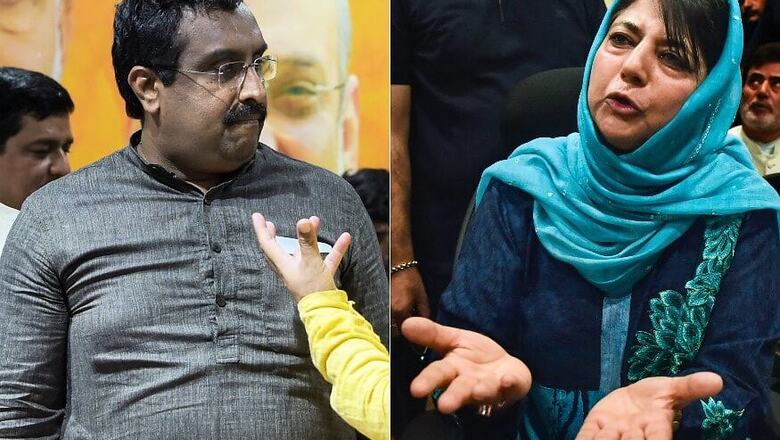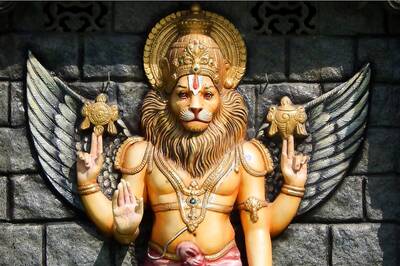
views
New Delhi/Srinagar: The BJP took everyone, including Jammu and Kashmir CM Mehbooba Mufti by surprise on Tuesday afternoon when the party pulled out of its alliance with the ruling PDP. As blame games ensued in the subsequent hours, Governor NN Vohra appealed to President Ram Nath Kovind asking for governor's rule after Mufti quit as the chief minister.
Later in the evening, Governor NN Vohra recommended imposition of central rule in his report to President Ram Nath Kovind, a copy of which was also forwarded to the Union Home Ministry, according to a Raj Bhavan spokesperson in Srinagar.
BJP general secretary Ram Madhav made the announcement on Tuesday afternoon that the party was withdrawing support to the coalition government, blaming Mufti’s PDP for failing to control the situation in Kashmir.
The announcement came soon after the BJP high command summoned its Jammu and Kashmir ministers for emergency consultations in New Delhi. The state government has been wracked by bitter political feuds and worsening security challenges.
A few hours later, Mehbooba Mufti submitted her resignation to Governor Vohra as things continued to heat up in both Srinagar and New Delhi. She later said, “Muscular policy of the security forces won’t work in Kashmir."
"It has become untenable for the BJP to continue in the alliance government in Jammu and Kashmir," Madhav told a hurriedly called press conference in Delhi.
Officials said the news that the BJP had pulled out of its alliance with the PDP was broken to Mehbooba by Vohra that brought her tenure to an abrupt end. Mehbooba succeeded her father Mufti Mohammed Sayeed as chief minister on April 4, 2016 after his death.
The BJP won 25 seats and the PDP 28 in the 87-member assembly and formed an alliance, two months after the December 2014 elections. The NC has 15 seats, the Congress 12 and others seven.
Madhav said the decision to withdraw was taken after consulting Prime Minister Narendra Modi and party chief Amit Shah.
The BJP blamed the PDP for failing to improve the security conditions in the Kashmir Valley. Madhav cited last week's killing of senior journalist Shujaat Bukhari in the heart of Srinagar in the highly secured area of Press Enclave by unidentified gunmen. The same day -- two days before Eid -- an Army jawan was abducted while going on Eid leave and killed.
"Keeping in mind that Jammu and Kashmir is an integral part of India and in order to control the prevailing situation in the state, we have decided that it is high time the reins of power in the state be handed over to the governor," Madhav added.
Terrorism, violence and radicalism have risen and the fundamental rights of citizens, including right to life and free speech, are in danger, the BJP leader said.
"Centre did everything for the Valley. We've tried to put a full-stop to the ceasefire violations by Pakistan. PDP has not been successful in fulfilling its promises. Our leaders have been facing a lot of difficulties from PDP in developmental works in Jammu and Ladakh," he added.
"We are not questioning the intentions of PDP but they have failed in improving the condition of life in Kashmir," he added.
Mehbooba Mufti raised the bogey of Article 370 that grants special status to J and K as well as unilateral ceasefire, saying the "muscular security policy" will not work in the state and that reconciliation is the key.
"I am not shocked as this alliance was never for power. PDP never believes in power politics and we worked for the people," she told reporters after an hour-long meeting with her ministers and party workers at her residence after her resignation.
Mehbooba maintained that Jammu and Kashmir was not an enemy territory as being perceived by few. "We had always said muscular security policy will not work in J-K, reconciliation is key," she said.
National Conference leader Omar Abdullah, whose party is the third biggest in the assembly, captured the drama with one sentence, "I wish Mehbooba Mufti had resigned herself... instead of the having the rug pulled from under her feet."
Both Omar and the Congress said they will not form an alliance with any party to form government in the state. The BJP also said it favours governor's rule.
If imposed, it will be the fourth time since 2008 and the eighth time since 1977 that Jammu and Kashmir will see the governor’s rule.
Although the BJP and the PDP had campaigned vigorously against each other, they came together to stitch an alliance.
But the alliance never took hold and the two parties disagreed on most issues even as the security situation continued to deteriorate.
Immediately after Madhav's news conference, senior PDP minister and party's chief spokesperson Naeem Akhthar told reporters in Srinagar that the BJP's decision had caught the party by surprise.
BJP leader and Deputy Chief Minister Kavinder Gupta told reporters in Delhi that he and his ministerial colleagues have submitted their resignations to the governor as well as to the chief minister.

















Comments
0 comment